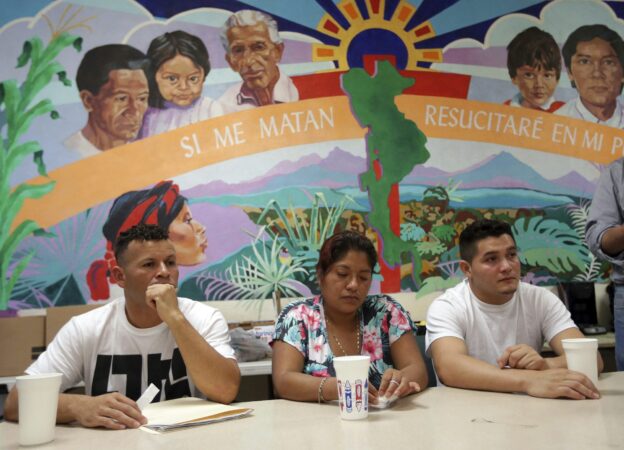
(RNS) — In the Baltimore suburb of Catonsville, a congregation of Catholic Burmese refugees and U.S.-born Catholics cultivates a community garden to supply the parish’s food pantry. They are inspired by Pope Francis’ 2015 encyclical, Laudato Si’, which calls us to protect our planet from environmental degradation and climate change.
Until Catholic Charities started resettling Burmese refugees in nearby apartments, Our Lady of Victory was a dwindling, mostly white congregation. Today this multinational and multigenerational congregation is so vibrant that it successfully opposed the Baltimore Archdiocese’s recent plan to merge it with other parishes as part of a broader consolidation effort.
Our Lady of Victory is a testimony to the power of Christianity to foster solidarity across lines of nationality, race and ethnicity while also promoting care for humanity and the planet. This is the power of Christian cosmopolitanism — a constellation of beliefs, practices and institutions that recognizes every human being as a member of God’s universal family, with all the rights, responsibilities and belonging that come with that sacred identity.
Rooted in the teachings of Jesus, Christian cosmopolitanism calls us to love our enemies, welcome strangers and emulate the Good Samaritan. In the Hebrew Bible, which presents the Israelites as God’s chosen people, Scripture also commands us to treat the foreigners among us as native-born and to love them as ourselves.
Christian cosmopolitanism contrasts sharply with Christian nationalism, which not only conceives the United States as a Christian nation but also proposes that a specific brand of Christianity must guide our government and laws. Adherents of this variety of Christianity, typically white and conservative, tend to consider it the only true Christianity.
A Christian may be patriotic, however, without embracing Christian nationalism. A Christian citizen of the United States can be proud of the values enshrined in the Constitution without expecting Christianity to form the basis of U.S. law or considering their fellow citizens of other religions (or those without religion) as less American.
Christianity can be woven into national cultures without necessarily resulting in Christian nationalism. In Brazil, to offer just one example, Our Lady of Aparecida — a particular devotion to the Virgin Mary — has become the country’s patroness, representing the local inculturation of the gospel. Christian nationalism is different because of its exclusionary nature, preventing non-Christians from belonging to the nation and subjecting them to their religious supremacy.
Christian cosmopolitanism instead calls for an expansion of our circle of concern. In 2018, I began facilitating dialogues on immigration in Christian congregations in Baltimore, aimed at promoting mutual understanding and collaboration between immigrants and those born in the city. By 2022, I had conducted such dialogues in 14 congregations of various demographic makeups (including one following the Jan. 6 insurrection). After each one, the participants would come together in a collaborative activity, such as a multicultural potluck with an immigration trivia game or a joint prayer service.
I’ve witnessed moments of tension. In one session, a white American man claimed to be Native American because he was born in the U.S. In another, an African American woman shared her discomfort with Latino shopkeepers speaking Spanish with their U.S.-born customers. But I also saw deeply moving moments. I watched a white U.S.-born woman cry as a young Latina recounted the hardships of crossing the border. A Latina faith leader told me the experience had been “like therapy” to her congregants.
Dialogue, however, is only one means to practice Christian cosmopolitanism. Across the country, Christians are embodying its principles in diverse ways. In a politically red area of Minnesota, pastors are helping different ethnic groups to share worship spaces and helping communities that have been diversified by immigration negotiate their various cultural needs. Several Christian organizations have publicly opposed the federal administration’s suspension of the U.S. refugee program and the dismantling of USAID. Some clergy and laypeople are even willing to engage in acts of cosmopolitan civil disobedience by offering sanctuary to undocumented immigrants.
We can all help weave God’s diverse yet universal family on earth. This Lent, a book club at my Episcopal congregation will discuss “The Ungrateful Refugee: What Immigrants Never Tell You,” by Dina Nayeri, hoping to help fellow congregants discern how to respond faithfully to immigrants and refugees. We can go outside our communities as well: Christian humanitarian organizations such as World Relief, Global Refuge and Catholic Relief Services urgently need volunteers and donations after the federal government cut ties with them.
Or perhaps you could take a simpler step: Invite immigrant members of your congregation for coffee and ask if they would like to start a community garden with you. As the Rev. Richard Rohr said, “The best criticism of the bad is the practice of the better.”
(Felipe Amin Filomeno is director of global studies at the University of Maryland, Baltimore County, where he is associate professor of political science, and the author of “Christian Cosmopolitanism: Faith Communities Talk Immigration.” The views expressed in this commentary do not necessarily reflect those of Religion News Service.)
